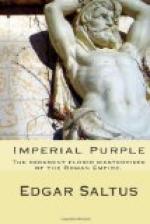Such was Rome. Augustus was less noteworthy; so unnecessary even that every student must regret Actium, Antony’s defeat, the passing of Caesar’s dream. For Antony was made for conquests; it was he who, fortune favoring, might have given the world to Rome. A splendid, an impudent bandit, first and foremost a soldier, calling himself a descendant of Hercules whom he resembled; hailed at Ephesus as Bacchus, in Egypt as Osiris; Asiatic in lavishness, and Teuton in his capacity for drink; vomiting in the open Forum, and making and unmaking kings; weaving with that viper of the Nile a romance which is history; passing initiate into the inimitable life, it would have been curious to have watched him that last night when the silence was stirred by the hum of harps, the cries of bacchantes bearing his tutelary god back to the Roman camp, while he said farewell to love, to empire and to life.
Augustus resembled him not at all. He was a colorless monarch; an emperor in everything but dignity, a prince in everything but grace; a tactician, not a soldier; a superstitious braggart, afraid of nothing but danger; seducing women to learn their husband’s secrets; exiling his daughter, not because she had lovers, but because she had other lovers than himself; exiling Ovid because of Livia, who in the end poisoned her prince, and adroitly, too; illiterate, blundering of speech, and coarse of manner—a hypocrite and a comedian in one—so guileful and yet so stupid that while a credulous moribund ordered the gods to be thanked that Augustus survived him, the people publicly applied to him an epithet which does not look well in print.
After Philippi and the suicide of Brutus; after Actium and Antony’s death, for the first time in ages, the gates of the Temple of Janus were closed. There was peace in the world; but it was the sword of Caesar, not of Augustus, that brought the insurgents to book. At each of the victories he was either asleep or ill. At the time of battle there was always some god warning him to be careful. The battle won, he was brave enough, considerate even.




